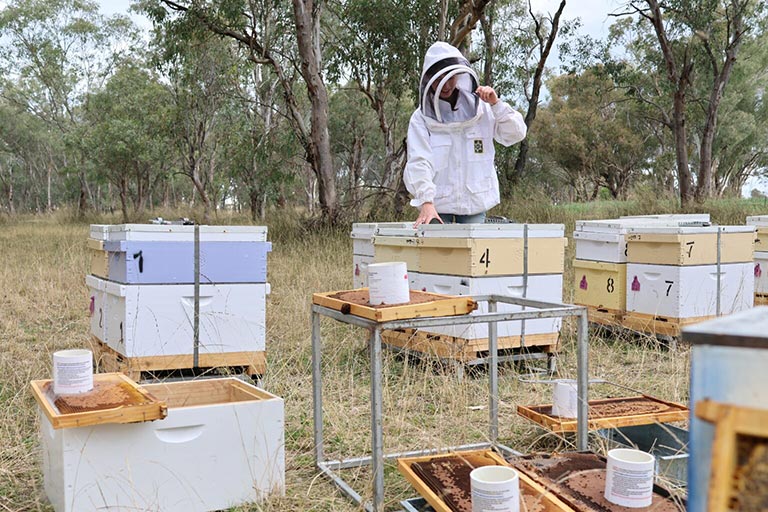
Researchers in Australia are pioneering a comprehensive genetic improvement program aimed at bolstering the resilience and productivity of honey bees. The initiative, known as Plan Bee, seeks to develop a more robust population of bees, which are crucial for pollinating crops that contribute over $12 billion to the Australian agricultural sector each year.
Launched with funding from the Australian Government’s Rural R&D for Profit Program, Plan Bee represents a significant investment in the future of beekeeping and the pollination industry. The program is a collaborative effort led by the NSW Department of Primary Industries, the University of Sydney, and the University of New England’s Animal Genetics and Breeding Unit (AGBU), with input from various stakeholders in the bee industry.
Advancing Bee Breeding Techniques
Plan Bee has successfully produced a range of genetic tools designed to enhance the breeding of honey bees. These include a national honey bee genetic database, a comprehensive breeding manual for beekeepers, and the country’s first estimated breeding values (EBVs) for key traits such as colony strength, aggression, and disease resistance.
According to Elizabeth Frost, Technical Specialist for Bees at NSW DPIRD, this initiative marks a shift in how bee breeders approach genetic improvement. “In the same way that Australian livestock producers use EBVs to select for profitable traits, bee breeders are now empowered to produce stronger, healthier, and more productive queens,” she explained.
The five-year project has established a national reference population comprising 50 breeder queens and 200 production colonies linked to commercial queen breeders across six states. This collaboration has enabled the development and validation of genetic testing methods, establishing a robust system for genetic evaluation.
Impact on Agriculture and Pollination
The implications of this research extend beyond the beekeeping industry, impacting agriculture as a whole. Pollination is essential for more than 60 major Australian crops, including almonds, canola, and zucchini. By enhancing the genetic traits of honey bees, the program aims to ensure that beekeepers can produce more resilient colonies that are better equipped to deal with environmental challenges, such as drought and bushfires, as well as threats from pests like the Varroa mite.
During national surveys, beekeepers indicated that key traits they sought to improve included honey production, temperament, and disease resistance. By quantifying the genetic merit of queens based on these criteria, beekeepers can identify and propagate the best-performing hives, thus driving economic and ecological benefits for the entire industry.
The genetic database currently holds information on approximately 5,500 colonies, allowing for detailed assessments of traits such as colony strength and disease resistance. This data is crucial for breeders looking to implement modern techniques that go beyond traditional mass selection methods.
“Bee breeders now have the tools to transition from classic mass selection to more controlled mating, which will lead to more efficient and accurate genetic improvement,” Frost noted. The initiative not only aims to enhance bee populations but also supports honey producers and farmers who rely on pollination for their crops.
The Plan Bee program began in 2020, prior to the first discovery of the Varroa mite in Australia. The insights gained through this research are vital for developing pest and disease resistance in bee populations. “We are ultimately striving for healthy, happy bees,” Frost stated, emphasizing the importance of selective breeding for pest resistance combined with standardized record-keeping practices.
Bee breeders can access training on utilizing the manual, setting breeding objectives, and selecting bees using EBVs. For further information, visit agrifutures.com.au/plan-bee to learn more about this innovative initiative.






